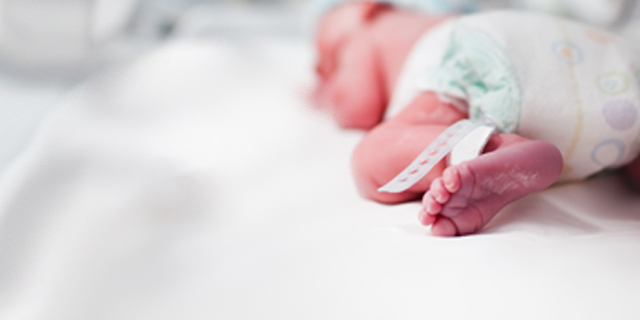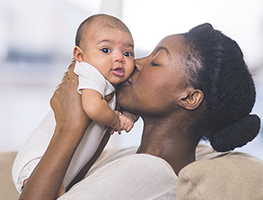Hey baby, so you're entering this big, wide world of wonder early. Now we know you've got that fighting spirit already in your heart so you take the time you need in NICU to get as strong as you can. Mom and dad are going to be extremely worried about you, (and always will be) so we spoke to our friend Lynne Bluff, a Childbirth Educator we've worked with for many years to help give mom and dad the information they'll need about your early arrival.
Mom and dad, this is for you. Now we know just how scary having a premature baby can be. We're not going to lie, you're going to be scared and it's going to be stressful. In all likelihood it's going to be a big surprise to you too, where you'll have to make quick decisions and feel completely unprepared.
Lynne Bluff answers a few common queries parents have:
Lynne: Depending on how premature your baby is and how distressed your baby is at birth will depend on whether you are able to hold your baby immediately after birth or not. Ask your healthcare provider if it's possible to hold your baby, and be understanding if you can't, it's all for your baby's wellbeing. Now if you can, get in as much skin-to-skin time as possible. Skin-to-skin is very helpful to stabilise a baby’s heart rate, breathing rate and temperature. It's also one of the most special moments a mom can have and starts the everlasting bond between mom and baby.
If this is not possible, don’t be devastated, it will be something to look forward to in the future once your baby is stable.
In all likelihood, your premature baby will be taken to the neonatal unit where they will be seen by a paediatrician - if the paediatrician is not already present at the actual birth.
At 1 and 5 minutes after birth, your baby will be assessed for her Apgar – breathing, heart rate, colour, muscle tone and muscle activity. Baby will be assessed, and if necessary steps will be taken to help your baby, the most common steps are to be given oxygen and placed in a warmer/incubator.
Where does your baby go next?
Once your baby is in the NICU (Neonatal Intensive Care Unit), he will probably be hooked up to all sorts of machines and tubes. This can be frightening to see and to be in an environment with all sorts of machines beeping and alarms going off everywhere. But don't worry, it's all for their good and to get your baby into your arms as fast as possible.
Baby will probably be placed in an incubator or warmer to keep warm as they may not be able to control his or her temperature at this stage. Your baby may also be receiving oxygen via the incubator or a headbox, or may even be placed on a ventilator that breathes for them. Baby will in all likelihood have at least one drip up for fluid and medication. There's also a nasogastric tube that runs down their nose to their stomach to feed. Baby may be connected to a heart machine that is monitoring their heart rate, breathing rate, oxygen saturation and more. Ask if you may hold your baby. Touch baby, talk softly to him or her so baby can hear your voice and be reassured that mom and dad are there and will always have the love baby needs. Take this time to hold your baby's tiny fingers in yours and fall in love.
What will your baby look like?
Your baby will look like a small, miniature baby depending on its gestation and its birth weight. Don't be frightened that your baby looks very thin, there just hasn’t been time to build up fat levels under the skin yet.
Your baby will be covered in lanugo. It's very fine downy hair and makes your baby look very hairy, this falls away as your baby gets older. Your baby will also be covered with vernix, which is a greasy substance that helps protect the skin for the time that baby lives in the amniotic fluid in the uterus. Depending on how old your baby is, the skin will be very fragile, paper-thin and will have a reddish colour.
What is the process for feeding?
A very premature baby will probably not be given food via the mouth for a short period of time. They will next be given expressed breast milk, which is very important for their gut health. Mom, try hard to express your colostrum and breast milk into a sterile container so it can be given to your baby. The milk you've collected will be given via a nasogastric tube. As mentioned before, it's a very thin tube that is passed down the nostril into the stomach. This will be how your baby is fed until their sucking reflex is strong enough and baby is able to suck for themselves. As baby gets stronger and his sucking reflex develops, he or she will be allowed to suck from the breast for a short period of time. But making sure that he or she doesn’t use up too much energy doing this is important because your baby could start losing weight. The rest of the feed will then be given by the nasogastric tube. This will process will continue as you keep encouraging baby to suck from your breast for longer and more frequently. This will keep happening until your baby is sucking vigorously and well from the breast/bottle at every feed and he continues to put on weight at a good rate.
Why is breast best for preemies?
Our friend Verena Bolton, the National Coordinator for Ncelisa Human Milk Banks spoke to us about what benefits breast milk has for babies, especially little preemies.
Verena: Breastmilk is VITAL for the really tiny babies for so many reasons. Firstly, from 30 weeks onwards immunity is passed from mom to foetus via the placenta passively. Babies born prematurely from 30 weeks onward will come into the world with interrupted immunity, the longer they stay in the uterus, the better is their supply of antibodies.
Mom’s colostrum and breastmilk is extremely rich in the antibodies that baby will need to fight any infection. So, for preemies who miss out on the passive transfer of antibodies, breastmilk is VITAL in reducing their risk of infection. Infection is the biggest cause of morbidity in prems, their little bodies are really vulnerable to it and can make their stay in NICU longer than expected.
Your nurse in the NICU will help to get your breastmilk coming in as much as possible, but for mom’s who can’t express there’s the options of donor milk. Ncelisa Milk Bank is one of South Africa’s few milk banks that help get critical breastmilk to babies where mom can’t feed.
When can you hold your baby?
Generally, preemie babies will be allowed to be held once they have stabilised. But, do keep asking your healthcare professional to hold your baby and have skin-to-skin time. Your baby will look very fragile and it will worry you that you may hurt him/her by holding them, but trust your instincts and let the NICU staff guide you. Take a deep breath and go for it – it's a very intimate and special moment for you, and so important for your baby to feel loved and hugged – it makes such a difference in their recovery time. In the beginning, take every opportunity to touch your baby even if you cannot hold him. Touch him and massage him with firm massage, not light tickling touch as that can be unpleasant for them.
Can I change my baby’s nappy in the NICU?
Once your baby is stable you will be allowed to help with care – changing nappies and tube-feeding them. You will also be allowed to cuddle your baby and do skin-to-skin with them. Try to be as hands-on as possible in caring for your baby, so that when the time to go home arrives you are used to caring for them.
What happens next?
During the hospital stay, your baby needs to grow and mature as fast as possible and you'll probably hear that your baby needs to be thriving. That really means gaining as much weight and growing as much as possible. Now, don’t lose sight of the fact baby was supposed to still be in his warm watery home of the uterus for a few more weeks or months. Your baby still needs this time to develop and mature.
When can you take your baby home?
Mom, you'll be ready to go home but as you know, your baby won't be. “The one thing a mother will never be prepared for is leaving the hospital without her baby,” says Candice, a NICU mom we spoke to. “That is the hardest part, but it will get easier. You will learn to trust that your daughter/son is in the best care, and the entire staff, as well as your little one, is working to get them home.” Here are a few checks that will help you understand when your baby can head home with you.
• Your baby should be able to maintain his temperature
• Baby has to feed every feed successfully
• He or she should have no apnoea (not breathing) for at least a week
• Baby must gain and maintain weight at about 130g per week
• Baby should not be receiving any more antibiotics or oxygen
• You as parents should be able to take care of your premature baby by yourself
How do hospitals prepare you for taking home your preemie?
Hospitals will guide you in every way they can, remember it takes a special kind of person to be a NICU nurse. That said, a great way to learn is to visit as much as possible and do everything for your baby while they are under constant care in hospital, so by the time they are discharged you are used to dealing with them and are able to do everything for them that they need.
Where can you get additional help?
If you need extra help, a list of lactation consultants, childbirth educators and Well Baby clinic sisters are available in the Expectant Mothers Guide magazine, on the website www.expectantmothersguide.co.za as well as from the Expectant Mothers Guide Journey App.
You can also read: "Prematurity – adjusting your dream", it's a South African book about prematurity and is available from www.littlesteps.co.za
A final word
It's important to realise this is a long journey with ups and downs on a daily basis. A premature baby is at risk of many health problems that can arise at any time. It can be a stressful journey as one moment your baby is doing really well and the next a complication can set in, and he or she can take two steps backwards. It can be a complex journey that sometimes can even last for a few months of hospitalisation.
Always remember to be strong for your baby, you are their world and your constant support, touch and love gives them that strength they need to get through this.
Mom, dad and Huggies® have got you baby!
























